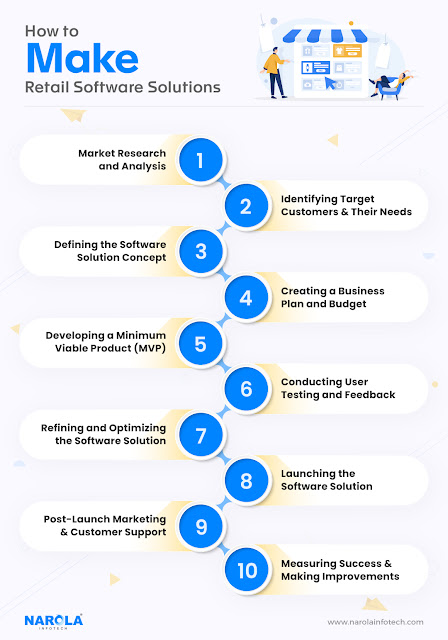Retail businesses operate in a dynamic and competitive environment, requiring efficient management of operations and resources to deliver exceptional customer experiences.
Retail software solutions have become a critical
component for businesses in the retail industry to streamline their operations
and drive growth.
In this blog post, we will explore what retail
software solutions are, their importance in the industry, and the benefits they
provide.
What are Retail Software Solutions?
Retail
software solutions are software applications designed to meet the
specific needs of retail businesses.
These solutions help retailers automate and
optimize various aspects of their operations, including inventory management,
sales transactions, customer engagement, and marketing.
Retail software solutions are typically
cloud-based, providing real-time access to data and enabling businesses to
manage operations across multiple channels, including physical stores and
online platforms.
Importance of Retail Software Solutions
Retail
software solutions have become increasingly important for businesses
in the industry due to several factors.
Firstly, retail businesses face significant
competition from online retailers and need to offer a seamless shopping
experience to their customers.
Secondly, retailers generate vast amounts of data
from various sources, and software solutions can help businesses leverage this
data to drive growth and improve operations.
Thirdly, retail businesses operate on thin margins,
and software solutions can help businesses optimize costs and improve
efficiency.
Benefits of Retail Software Solutions
Retail software solutions offer several benefits to
businesses in the industry, including:
Streamlining
Operations
Retail software solutions automate various aspects
of retail operations, including inventory management, sales transactions, and
order fulfillment, reducing manual effort and improving efficiency. By
automating these processes, retailers can focus on delivering exceptional
customer experiences.
Improving Customer Engagement
Retail software solutions enable businesses to
engage with customers across multiple channels, including email, social media,
and loyalty programs. These solutions provide retailers with customer insights,
allowing them to deliver personalized experiences and build brand loyalty.
Optimizing
Inventory Management
Retail software solutions provide real-time
visibility into inventory levels, enabling retailers to optimize stock levels
and avoid stockouts and overstock situations. By optimizing inventory
management, businesses can reduce costs and improve operational efficiency.
Enhancing
Analytics and Insights
Retail software solutions enable businesses to
leverage data to gain insights into their operations and make informed
decisions. By analyzing sales trends, customer behavior, and other data points,
retailers can optimize pricing strategies, identify top-performing products,
and improve overall business performance.
Conclusion
Retail
software solutions have become an integral part of the retail
industry, offering businesses a range of benefits, including operational
efficiency, improved customer engagement, optimized inventory management, and
enhanced analytics and insights.
By leveraging the right retail software solutions,
businesses can gain a competitive edge, enhance customer experiences, and drive
growth in an increasingly competitive market.
Don’t
Miss to Read
Custom
ECommerce Development: Everything You Need to Know (2023)

Comments
Post a Comment